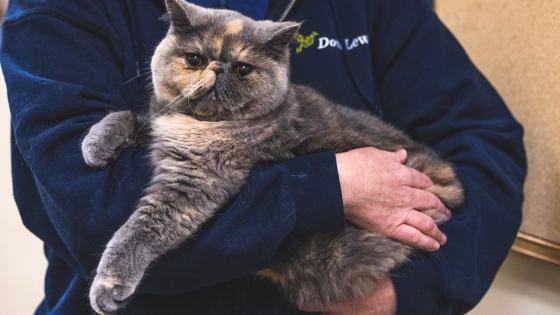Outdoor Risks, Pet Preparedness, and Signs of Respiratory Distress
Outdoor Risks, Pet Preparedness, and Signs of Respiratory Distress
With smoke in the air and evacuations in progress, pet owners can take simple steps to keep their pets healthy and safe.
PORTLAND, Ore. – Smoke can cause serious health issues for pets. Doctors at DoveLewis Veterinary Emergency & Specialty Hospital warn pet owners to limit outdoor access and avoid contaminated areas.
Certain animals are especially at risk for health issues, including puppies and older dogs, pets with asthma and bronchitis, and dogs with rounder faces and shorter noses (bulldogs, Boston terriers, etc.). Smoke inhalation can also cause disorientation and confusion, fainting, lethargy and seizures. Owners should seek immediate veterinary care for their pets if they show symptoms of illness.
Signs of respiratory stress include:
- Difficulty breathing
- Unusual or excessive coughing, sneezing, vomiting or loss of appetite
- Swelling or inflammation of the mouth, eyes, skin or upper airway
- Open-mouthed breathing, especially in cats
- Weakness/lethargy
- Uncoordinated walking/unable to stand
- Increased salivation
As families prepare to evacuate, their pet’s evacuation kit should include items that support day-to-day wellbeing and unexpected health emergencies. “It’s important to consider your pets in your disaster planning. Just as you would prepare for your human family members, you’ll need to make special preparations for all of your pets,” said Dr. Ladan Mohammad-Zadeh, DoveLewis critical care specialist.
Suggestions for your pet’s evacuation kit:
- Pet ID, a current photo, and microchip information (https://www.dovelewis.org/press/updated-microchip-best-way-be-reunited-your-lost-pet)
- Copy of current medical and vaccine records
- Pet medications (minimum of three-day supply)
- Pet First Aid Kit (https://www.dovelewis.org/pet-owners/keeping-pets-healthy/blog/how-build-pet-first-aid-kit)
- Leashes and collars
- Carriers/crates, and bedding or blankets
- Litter and disposable litter trays
- Cleaning supplies and garbage bags
- Food, water, and feeding bowls
- List of nearby medical facilities
DoveLewis is open 24 hours a day, seven days a week to help animals needing emergency medical treatment.
###




